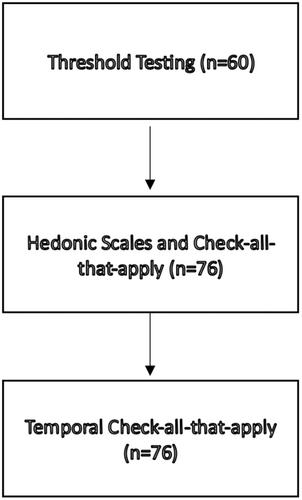Chemical irritants, like piperine in pepper, have been identified to have cross-modal interactions, including increasing the perception of saltiness. Processed foods have used cross-modal interactions (e.g., odor and taste) to improve acceptability of salt-reduced foods. Cross-modal interactions between piperine and taste could be applied to increase consumer perception of saltiness in low-sodium food products. As such the objective of this study was to determine how the addition of white pepper to low-sodium soup affects its' sensory perception. First, the aroma detection threshold (n = 60) of white pepper was determined. Then white pepper (at detection threshold) was added to a low-sodium soup and evaluated using hedonic scales, general labeled magnitude scale for saltiness, check-all-that-apply (CATA), and temporal check-all-that-apply (TCATA; n = 76). The results indicated that the saltiness intensity increased with the addition of white pepper based on the results of the general labeled magnitude scale; however, this result was not confirmed using CATA or TCATA. Rather peppery, bitterness, sourness, and strong aftertaste attributes dominated the participants' perception of the soup. The addition of white pepper also decreased the participants' overall liking of the soup as well as their liking of the flavor and texture. Future research should continue to investigate the cross-modal interactions of white pepper.
The food industry is acting in response to consumer concerns by reducing the salt content in their foods. Despite being a positive initiative for human health, a reduction in the salt content of foods can yield a reduction in sensory appeal and flavor intensity. This study investigated the use of white pepper to increase the saltiness perception of low-sodium soup. The results indicated that white pepper added bitterness and strong aftertaste to the soup while simultaneously suppressing other flavors. This study also found that white pepper decreased the acceptability of the soup and indicated that white pepper may not be an ingredient that can mitigate the reduction in salt in food products.



